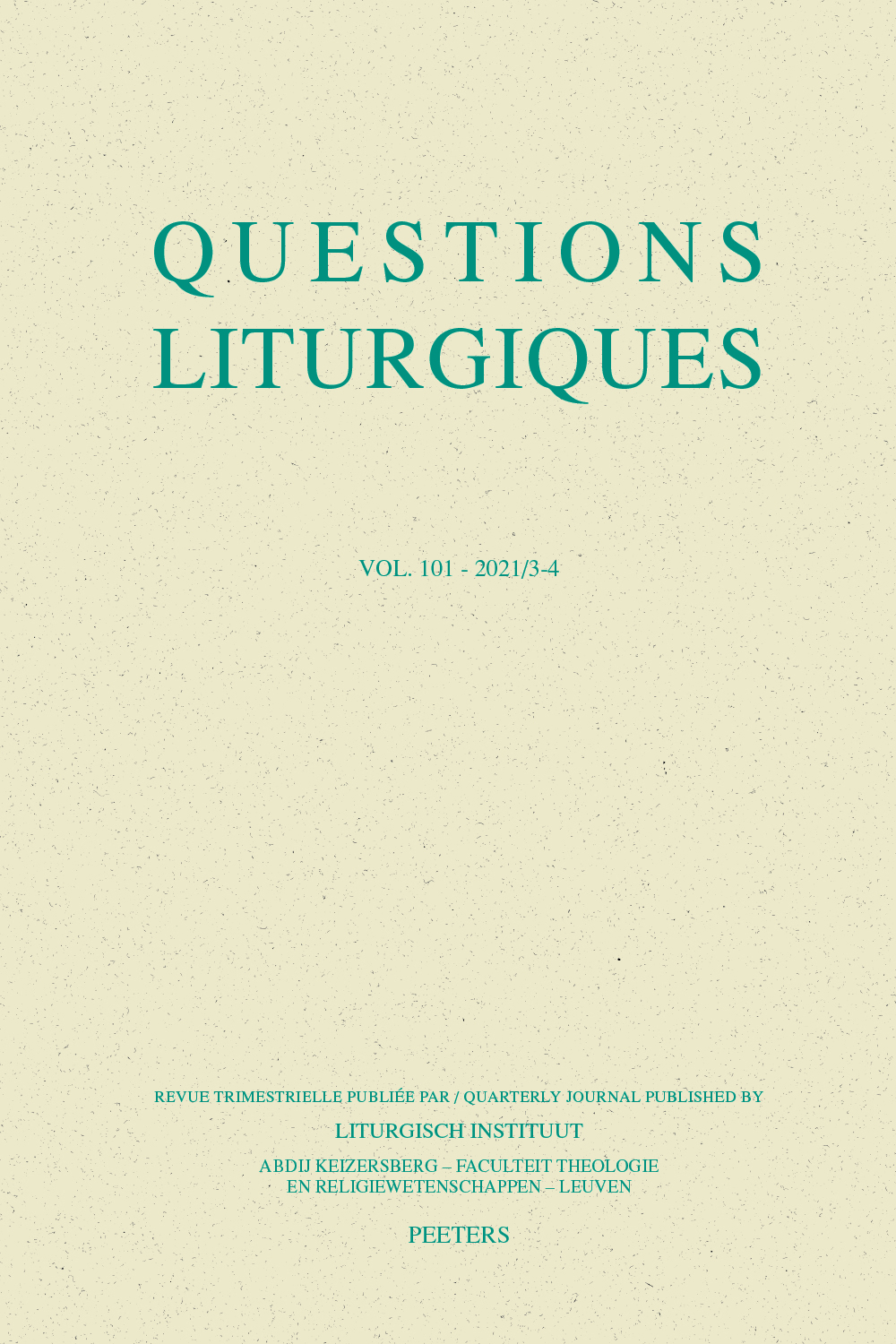next article in this issue  |

Preview first page |
Document Details : Title: Sacrosanctum concilium and its Consequences Subtitle: The Reform of the Liturgy Author(s): CARR, Ephrem Journal: Questions Liturgiques/Studies in Liturgy Volume: 92 Issue: 3 Date: 2011 Pages: 183-194 DOI: 10.2143/QL.92.3.2146553 Abstract : The article responds to the questions: 'Why for some time have there been so many controversies about the liturgical reform that followed the Second Vatican Council?' and 'What are the reasons for the disillusionment and disappointment which some in the Church find with the post-conciliar reform of the Roman liturgy?' At a distance of almost fifty years from the first session the Vatican Council the constitution on the liturgy still raises interest and sometimes provokes animated discussion. The article emphasises the need to understand the pastoral context of the Vatican II reform of the liturgy in order to come to a correct understanding of the document and the event. Pope John XXIII and the Council fathers in 1962 all treat the forthcoming Council as pastoral in character (p 184-186). Thus it is that the reform of the liturgy is to be seen as part of the reform of the whole church (p 187). Some recent critics seem to want to oppose the conciliar constitution and the reformed liturgy. This 'quasi-antagonistic' presentation is described as 'flawed from the beginning' (p 191). Is the reform of the liturgy as it has occurred a coherent and legitimate consequence of the development of the Second Vatican Council or a deviation which risks pushing the church into chaos? In some quarters anxiety that the reform constitutes a menace for the faith and praxis of simple catholics still continues. In response to abuses, which have and certainly continued to exist, the response of authorities has been to create ever tighter legislation. Yet, the aspect of Sacrosanctum Concilium that has been most overlooked, and that from the very beginning, is the insistence on the need for liturgical catechesis for the faithful, for liturgical education for pastors and for the clergy in general as well as for seminarians and young religious and for solid liturgical formation for these same groups. This desire of the Church has never been fully implemented. The author commends the approach proposed by Pope John XXIII in his opening speech at Vatican II: 'Serenity of mind, fraternal concord, moderation in proposals, dignity in discussion, and wisdom of deliberation.' Better catechesis, formation and education in a context of faith and peace will produce the required fruit, the Church’s fuller and deeper participation in the liturgy and her more fruitful service of the world. Cet article se veut une réponse à la question «Pourquoi depuis si longtemps de nombreuses controverses autour de la réforme liturgique qui a suivi le Concile Vatican II» et «Quelles sont les raisons de désillusion et de désappointement que certains éprouvent dans l’Église catholique envers la réforme postconciliaire de la liturgie romaine»? À une distance de 50 ans déjà depuis la première session du Concile la constitution sur la liturgie retient toujours l’attention et suscite parfois des discussions animées. Cet article traduit le besoin de souligner le contexte pastoral de la réforme liturgique de Vatican II afin d’arriver à une compréhension correcte des documents et de l’événement. Le pape Jean XIII et les Pères du Concile ont considéré le Concile à venir comme ayant un caractère pastoral (p. 184-186). Ce qui amène à considérer la réforme de la liturgie comme une partie de la réforme de toute l’Église (p. 187). Certaines critiques récentes semblent vouloir opposer la constitution conciliaire et la liturgie réformée. Cette présentation «quasi-antagoniste» est décrite comme faussée depuis le début (p. 191). La réforme de la liturgie telle qu’elle est apparue est-elle une conséquence légitime du développement de Vatican II ou une déviation qui risque d’entraîner l’Église dans le chaos? Dans certains milieux l’anxiété que la réforme constitue une menace pour la foi et la pratique des catholiques ordinaires est toujours présente. En réponse aux abus qui ont certainement continué à exister, la réponse des autorités à été de créer toujours une législation de plus en plus serrée. Toutefois l’aspect de Sacrum Concilium qui a été le plus ignoré est l’insistance sur le besoin d’une catéchèse liturgique pour les fidèles, une éducation liturgique pour le clergé en général, une solide formation liturgique pour l’ensemble des chrétiens. Ce désir de l’Eglise n’a jamais pu être parfaitement réalisé. L’A. rappelle dès lors l’approche proposée par Jean XXIII lors de son discours d’ouverture à Vatican II «sérénité d’esprit, concorde fraternelle, modération dans les positions, dignité dans les discussions, et sagesse dans les délibérations». Une meilleure catéchèse, une formation et éducation dans un contexte de foi et de paix produiront les fruits souhaités, une participation plus plénière et profonde de l’Église dans la liturgie et dans son service envers le monde. |
|


